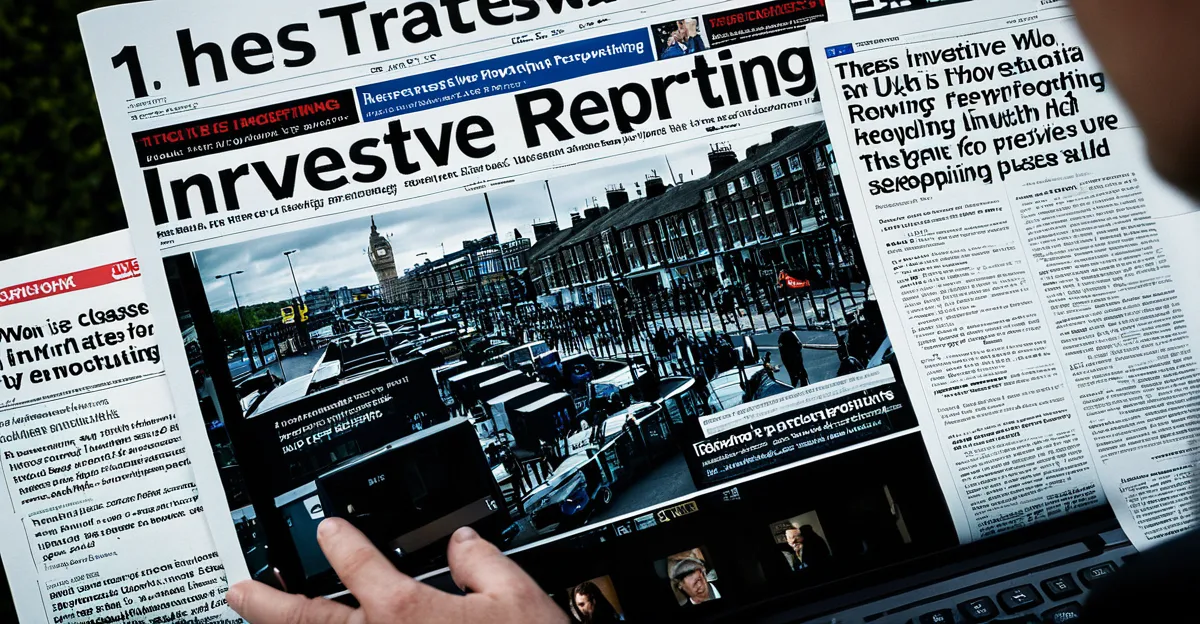Recent trends shaping UK investigative journalism
Recent developments in UK media show a clear shift in newsroom priorities, with investigative journalism gaining heightened prominence. Newsrooms increasingly allocate resources to long-form and collaborative investigations, reflecting a move away from brief, surface-level reporting to in-depth stories that provide meaningful insights.
A growing emphasis on public interest topics dominates investigative journalism in the UK today. Journalists focus extensively on holding government entities and powerful institutions accountable, uncovering issues that directly impact society. This expanded focus aligns with evolving journalism practices in the UK, where transparency and societal impact guide editorial decisions.
This might interest you : How is the UK planning to enhance cybersecurity infrastructure?
Collaboration between media organizations has become a prominent trend, enabling cross-outlet sharing of resources and expertise. This strengthens the depth and reach of investigative projects, producing robust outcomes. These trends illustrate how UK investigative journalism continues to evolve by prioritizing accountability and cooperative storytelling.
Impact of technology and social media on investigative practices
Technology in investigative journalism UK has drastically transformed how reporters gather, verify, and present information. The adoption of data journalism and sophisticated digital research tools UK equips journalists to analyze vast datasets, uncover hidden patterns, and produce evidence-backed stories. These tools enhance precision in storytelling, making investigations more impactful and harder to refute.
Additional reading : What Are the Unseen Impacts of Brexit on UK Society?
Social media influence plays a critical role in shaping investigative processes. Platforms serve as real-time sources for leads, eyewitness accounts, and public reactions. Journalists harness social media to crowdsource information rapidly and engage audiences more interactively. However, this influence also brings challenges, such as verifying unvetted content amid misinformation risks.
Digital journalism tools UK, including secure communication apps and multimedia storytelling software, enable journalists to collaborate seamlessly across borders. While digital publishing broadens story reach, it introduces complexities like maintaining data security, protecting sources, and coping with faster news cycles. Nonetheless, technology in investigative journalism UK continues to empower reporters to pursue deeper, more transparent investigations while fostering a more informed public.
Funding models and newsroom adaptations
Funding investigative journalism UK has experienced a noticeable transformation. Traditional revenue streams such as advertising and subscriptions face decline, prompting newsrooms to explore alternative approaches. Nonprofit journalism UK models now play a significant role, supported by donations, grants, and crowdfunding. This shift allows greater editorial independence but often demands greater transparency in budgeting and impact reporting.
Newsroom changes accompany these funding models. Many outlets establish dedicated investigative units, which focus exclusively on long-term, resource-intensive stories. These units benefit from partnerships across organizations, pooling resources and expertise to enhance investigative depth. Collaborative projects are increasingly vital for overcoming budget constraints.
Budgetary pressures persist as a primary challenge. Reduced funding can limit the scope and frequency of investigations, forcing journalists to prioritize high-impact stories carefully. However, the rise of nonprofit journalism UK and innovative funding mechanisms is helping to sustain investigative capacity despite financial constraints.
In sum, adapting funding investigative journalism UK calls for creativity and collaboration. Nonprofit models and newsroom transformations work hand-in-hand to bolster investigative reporting, ensuring continued accountability journalism in a changing media landscape.
Notable recent investigative projects in the UK
Recent notable UK investigations have captured national attention by exposing critical societal issues. High-impact exposés delve deeply into public institutions, revealing corruption, malpractice, or systemic failures. For example, investigations into government spending or corporate misconduct highlight how investigative reporting examples UK can lead to tangible reforms or public outcry.
Cross-organization collaborations have become a hallmark of landmark journalism projects UK. Multiple news outlets now pool resources and expertise, producing comprehensive investigations that no single newsroom could manage alone. This cooperative approach leverages diverse skill sets and expands audience reach.
Recognition for investigative journalism includes prestigious awards that validate the importance and quality of these efforts in the UK media landscape. Such accolades encourage professionals to pursue challenging stories and elevate standards within the field.
These recent developments illustrate how investigative reporting examples UK continue to evolve with strategic partnerships and impactful storytelling. Journalists engage audiences effectively while holding power to account, making these projects critical components of UK investigative journalism trends.
Legal, regulatory, and political influences
Media law UK profoundly shapes investigative journalism by setting boundaries around defamation, privacy, and data protection. Recent regulations impacting journalism impose stricter rules on what reporters can publish, especially regarding personal information. These laws aim to balance press freedom UK with individuals’ rights, often requiring journalists to navigate complex legal territory carefully.
Press freedom UK faces ongoing challenges from political pressures, with some governments attempting to influence or restrict reporting. Such pressures can lead to self-censorship or hinder investigations into powerful figures. Journalists must remain vigilant to uphold ethical standards amid these constraints.
Regulatory bodies play crucial roles in maintaining journalistic standards in the UK. Organizations oversee adherence to codes of conduct and can sanction outlets for breaches. Understanding this regulatory framework helps UK investigative journalism maintain credibility and public trust.
In summary, media law UK, combined with evolving regulations and political dynamics, directly impacts how investigative journalists operate. These influences demand a careful balance between exposing truth and respecting legal limits to ensure responsible and effective reporting.






